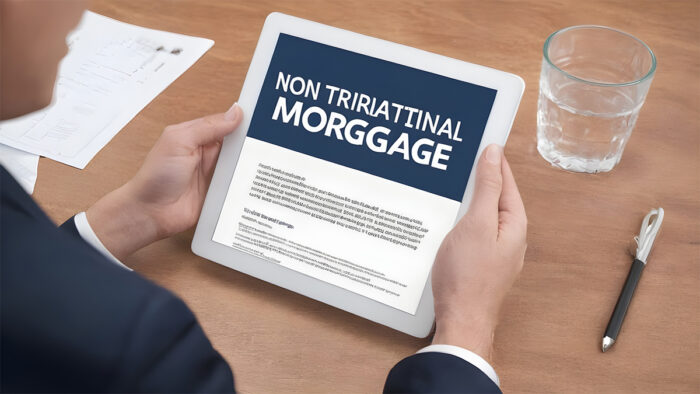A nontraditional mortgage is a type of loan that deviates from standard mortgage characteristics, offering borrowers more flexibility in repayment terms and qualification requirements. These mortgages do not follow traditional amortization schedules and may involve higher interest rates due to increased payment risks.

Nontraditional mortgages are typically easier to qualify for than conventional loans, making them attractive to subprime borrowers or those in unique financial situations. However, they come with risks such as higher interest rates and potential default due to unconventional payment terms. It’s crucial for borrowers to carefully consider the trade-offs before opting for a nontraditional mortgage.
How a Nontraditional Mortgage Works
A nontraditional mortgage works by offering borrowers alternative repayment structures and qualification criteria compared to traditional mortgages. These mortgages do not follow standard amortization schedules and may involve higher interest rates due to increased payment risks.
Borrowers can defer principal and an interest payment until the full balance is due, providing more flexibility in repayment options. Examples of nontraditional mortgages include balloon loans, hybrid ARMs, and interest-only mortgages.
Borrowers have the flexibility to choose from various payment options, such as deferring principal payments or opting for interest-only payments, until a lump sum is due at the end of the loan term. While nontraditional mortgages are easier to qualify for than conventional loans, they come with risks such as higher interest rates and potential default due to unconventional payment terms.
In essence, nontraditional mortgages offer borrowers more flexible repayment terms, allowing them to defer payments and choose from various payment options, but they also come with higher risks and potentially higher interest rates compared to traditional mortgages.
Types of Nontraditional Mortgages
Types of nontraditional mortgages include various options that deviate from standard mortgage characteristics, offering borrowers flexibility in repayment terms and qualification requirements. Some common types of nontraditional mortgages are:
• Balloon mortgage loans
In balloon loans, both principal and interest payments can be deferred until the maturity date, where a lump-sum payment is required.
These loans often come with higher interest rates and offer deferred payments, making them popular among developers.
• Interest-Only Mortgages
Interest-only loans require borrowers to make regular interest payments, followed by a lump-sum principal payment at maturity. Developers commonly use these loans, with options to refinance or use take-out loans at maturity.
• Payment-Option Adjustable-Rate Mortgages (ARMs)
Payment-option ARMs provide flexibility by allowing borrowers to choose different payment options. Initially, a fixed-rate interest payment is required, followed by a variable-rate loan with high margins to compensate for risks.
These nontraditional mortgages offer borrowers more flexible repayment terms, such as deferring payments or choosing interest-only options until a lump sum is due. While they provide flexibility, they also come with risks like higher interest rates and potential default due to unconventional payment terms.
Do I Need a Nontraditional Mortgage?
Whether you need a nontraditional mortgage depends on your financial situation and needs. Nontraditional mortgages offer more flexible repayment terms and easier qualification criteria compared to traditional loans.
They can be beneficial for borrowers in unique financial situations or with nontraditional income sources. These mortgages allow for deferred payments, interest-only options, and various payment structures, providing flexibility but also carrying higher risks such as potential default and higher interest rates.
If you have nontraditional assets, income, or employment that may not meet the requirements of traditional lenders, a nontraditional mortgage could be a viable option. However, it’s essential to carefully consider the trade-offs, including potentially higher interest rates and the risks associated with unconventional payment terms.
Nontraditional mortgages are often extended to borrowers in nontraditional situations, like subprime borrowers who may not qualify for conventional loans.
If you have unique financial circumstances that traditional lenders may not accept, a nontraditional mortgage could provide the flexibility you need. It’s crucial to weigh the benefits and risks before deciding if a nontraditional mortgage is suitable for your specific situation.
Pros and Cons of Nontraditional Mortgages
Nontraditional mortgages offer unique benefits and drawbacks that borrowers should carefully consider before opting for this type of loan.
Pros
- Lower Monthly Payments: Nontraditional mortgages often provide lower monthly payments, making them attractive for borrowers seeking more affordable options.
- Flexibility in Repayment: These mortgages offer flexible payment options, allowing borrowers to defer payments or choose interest-only options until a lump sum is due.
- Easier Qualification: Nontraditional mortgages have less stringent credit and debt-to-income requirements, making them easier to qualify for than conventional loans.
- Quick Wealth Accumulation: Borrowers can accumulate wealth faster with nontraditional mortgages, as they can make a full payment at a later date.
Cons
- Higher Interest Rates: Nontraditional mortgages may come with higher interest rates to offset the risk of default due to unconventional payment terms.
- Risk of Default: Flexible payment options can lead to a higher risk of default if borrowers only make minimum payments or defer payments, increasing the total amount owed.
- Lack of Equity: With some nontraditional loans, borrowers may not build equity in their property, potentially leading to financial challenges when selling the home with little to no equity.
- Housing Market Risks: In scenarios where housing prices fall, borrowers with interest-only loans may face challenges selling their homes if the value drops significantly.
While nontraditional mortgages offer flexibility and lower initial payments, they also come with risks such as higher interest rates, potential default, and challenges in building equity. Borrowers should carefully weigh these pros and cons before deciding if a nontraditional mortgage is suitable for their financial situation and needs.
How to Get a Traditional Mortgage
To acquire a nontraditional mortgage, individuals should begin by evaluating their financial position and determining if their circumstances necessitate this type of loan. Researching lenders who offer nontraditional mortgage products is crucial, as different institutions may have varying options available.
Understanding the types of nontraditional mortgages, such as balloon loans and interest-only mortgages, is essential to making an informed decision. Prospective borrowers should assess the risks and benefits associated with nontraditional mortgages, considering factors like lower monthly payments but higher interest rates and potential default risks.
Meeting the eligibility criteria set by lenders, gathering the necessary documentation, and applying for pre-approval are key steps in the process. Comparing offers from multiple lenders, seeking advice from mortgage specialists or financial advisors, and finalizing the loan agreement are vital to successfully securing a nontraditional mortgage that aligns with one’s financial goals and needs.
FAQs
Are nontraditional mortgages risky?
While nontraditional mortgages provide flexibility in repayment, they can pose risks such as higher interest rates, potential default due to deferred payments, and challenges in building equity in the property.
Who qualifies for nontraditional mortgages?
Borrowers with nontraditional income sources or unique financial situations that may not meet traditional lender requirements often opt for nontraditional mortgages, which have less stringent credit and debt-to-income requirements but may come with higher interest rates.
What are the benefits of nontraditional mortgages?
Nontraditional mortgages offer lower initial payments, flexible repayment options, and easier qualification criteria compared to traditional loans, making them attractive for borrowers with unique financial circumstances.
How do nontraditional mortgages impact credit scores?
Nontraditional mortgages can impact credit scores based on factors like payment history, debt utilization, and overall financial management. Timely payments can positively affect credit scores, while defaults can have adverse effects.



